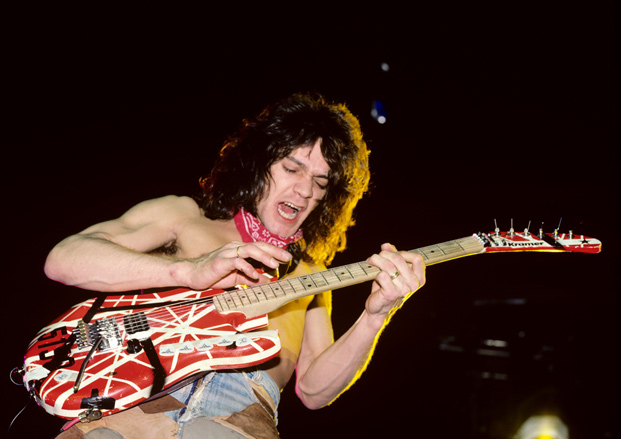30 Legends Choose the Songs They Want to Be Remembered By

From the GW Archive: This feature originally appeared in the May 2002 issue of Guitar World. The story has a "time capsule" theme: We asked several veteran guitarists to choose the one song they'd most want to be remembered by after many years. Here we are, 14 years later (Does that qualify as "many"?), opening the time capsule to examine its contents! Enjoy!
A few decades ago, NASA sent a probe called Voyager straight out of the solar system.
Its mission: to make contact with alien intelligence. The capsule was crammed with artifacts—including greetings in more than 50 languages—intended to convey information about Earth's cultures. But just in case those items failed to communicate across language barriers, NASA also included a recording of Chuck Berry performing his rock and roll masterpiece "Johnny B. Goode."
For a while after Voyager's launch, the joke around the agency was that a reply had been received from an alien civilization: "Forget the scientific shit," went the message.
"Send more rock and roll!" But what songs should be sent? We at Guitar World decided the logical place to start would be the musicians themselves. In a project that started almost five years ago (hence the inclusion of George Harrison), we began asking many of the most influential guitarists in rock, blues and metal one deceptively simple question: "If you had to put one of your songs in a time capsule to be opened sometime in the future, which would you choose, and why?"
Check out Part 1 of the story below.Look for Part 2 later this week.
Eddie Van Halen (Van Halen), "Jump"1984 (1984) "I'll probably be playing "Eruption" at every show for the rest of my life, but I guess my time capsule choice would have to be 'Jump.' At the time I really wanted to do something challenging. Diver Down, the album just before 1984, was half cover tunes, and I hated it. Our producer had told me his theory that if you redo a hit, you're halfway there. But I'd rather bomb with my own shit than make it with someone else's. So that's when I built my own studio, 5150, which was a major step for me—not to prove any point but just so I could be myself and experiment musically. People were telling me, 'You can't use keyboards, you're a guitar player!" So that's when I wrote 'Jump.' Musically, it was a real departure. We had the challenge of integrating the keyboards and synths with the guitar for the first time. "The word 'pop' comes from 'popular,' meaning a lot of people like it. Ninety-nine percent of the reason I make music is to, hopefully, touch people with it. And this one touched the most people—so far."
All the latest guitar news, interviews, lessons, reviews, deals and more, direct to your inbox!
Dimebag Darrell (Pantera), "Fucking Hostile"Vulgar Display of Power (1992) "I think the kind of music we play will stand the test of time for however long. But if I had to pick just one, I'd go with the powerful, off-the-cuff statement that is 'Fucking Hostile.' "When it came out it definitely set the tone and pace for what we were about. I also think our boy Philip [Anselmo, vocals] got it perfectly right lyrically and we got it perfectly right musically. "So I believe that if somebody heard this song 500 million years from now, they'd go, 'Goddamn, these motherfuckers knew what they were talking about and sure had their jamming skills down'. Plus, I think people will always be hostile, which is another reason I went with this one."
John Paul Jones (Led Zeppelin) "D'yer Mak'er,"Houses of the Holy (1973)"Stairway To Heaven,"Led Zeppelin IV (1971) "I'd put 'D'yer Mak'er' in a time capsule so I would never have to hear it again or have to explain how to pronounce the title. There were only two types of rhythms that Bonzo [John Bonham, drums] hated playing—shuffles and reggae. "We were jamming in the latter style at Stargroves, the house we rented from Mick Jagger, and John was going along with it out of politeness, I think. Unfortunately, the jam turning in to a proper song. He did play some marvelous fills, but for me, the whole thing was buttock-clenchingly embarrassing. "I would also include 'Stairway To Heaven,' but for more positive reasons. It contains all the classic Zep elements, from folk/Celtic through jazz and r&b to hard rock. It also encapsulates the soft-to-heavy dynamics that the band was famous for. "As for my own performance, it made me smile when a journalist once told me that he considered the bass line at the end of the song one of the finest ever recorded. Unfortunately, it happens to be underneath one of the finest guitar solos ever recorded!"
Kirk Hammett (Metallica), "Motorbreath"Kill 'Em All (1983) "I chose it because it has the breakneck tempo we were so fond of in our early days—plus the lyrics set the tone for our lives over the next 10 years. "And unlike the songs we wrote later, 'Motorbreath' is under four minutes long!"
Robby Krieger (The Doors), "Light My Fire"The Doors (1967) “I feel that ‘Light My Fire’ encapsulates the feel of the 1967 Summer of Love. Being in San Francisco or anywhere in California that summer seemed to be the beginning of a whole new way of life. One day at rehearsal, Jim [Morrison, vocals] suggested we all try and write some songs. I went home that night and wrote ‘Light My Fire’—it was the first song I’d ever written. "The long solo section was based on the modal playing of jazz great John Coltrane. Up until Miles Davis did Kind of Blue and Coltrane recorded ‘My Favorite Things,’ jazz had been mainly bebop, which involved a lot of fast, tricky chord changes. "So these guys thought, It’s easy to play over a bunch of chords and sound cool—but what can you do over just one or two chords? Can you play something that’s not just pentatonic—that’s based on a mode, a scale—over one chord, and take it farther out than anybody else has gone? "That was the start of modal playing, which influenced many rock musicians. My long, modal solo in this song was done over the same two chords John Coltrane soloed over on his version of ‘My Favorite Things’—A minor and B minor. So ‘Light My Fire’ helped light a fire for a new generation and opened people’s minds to a new vision. Almost four decades later, the song seems to remain timeless.”
Warren Haynes (Gov't Mule), "Mule"Gov't Mule (1995) "'Mule' is a uniquely Gov't Mule song. I've never hear another song that sounds similar to it. "There are riffs that could be traced back to some of our early influences—which stretch from Cream to Hendrix to Miles Davis and James Brown—but the way the thing is structured doesn't really remind me of another song. And that was always important to us—that most of our songs can't be traced directly back to other songs. "'Mule' was written at the last minute in rehearsal, right before recording, and it's a first take, so that solos were on the fly—totally spontaneous. It has an awesome bass like from Allen Woody and [Blues Traveler vocalist] John Popper guests on harmonica. "And it has a political message; the title refers to the fact that when the America slaves were free they were promised '40 acres and mule' by the U.S. government, which most never received. Here we used it as a broader metaphor about social oppression in so many aspects of modern society."
Joe Satriani, "Time"Live In San Fransisco (2001) “If we can assume that they have DVD players in the future, then I would pick ‘Time’ from the Live in San Francisco DVD, because, for better or worse, it captures what we actually do night after night around the world. "Although it’s near impossible for me to look at myself on a television screen, I’ve learned to accept that that’s what everyone’s been seeing and hearing for all these years, and I have not yet been thrown in prison for doing it. “The song is interesting to me, compositionally, because the verse is almost like a child’s melody played over the simplest riff. Then the second part of the song jumps into all of this complex harmony and a whole bunch of key changes. The solo section recreates the same scheme, and eventually the song changes meter. The song provides a wild journey of how to construct an interesting instrumental.”
Ace Frehley (Kiss), "Shock Me"Love Gun (1977) “I picked this song not only because it’s a well-known Kiss anthem but because it has deep personal significance for me. The song is based on an actual life-threatening experience I had onstage with Kiss in the Seventies in Lakeland, Florida. "At the beginning of the concert I was coming down the staircase and when my hand touched the railing I was electrocuted, thrown back and knocked out for about 10 seconds. "The roadies carried me down the rear staircase, behind the wall of Marshalls. I woke up with electrical burns on my hands and totally shaken. Paul [Stanley] announced what had happened, and the concert was delayed for approximately 10 minutes. The whole audience starting chanting ‘We want Ace, we want Ace!’ “I was so disoriented from the incident that I really didn’t think I was going to be able to do the show. But when I heard 15,000 people chanting my name, my adrenaline started pumping and all I could think was, The show must go on! I continued, even though I had almost no feeling in my hand for the remainder of the concert. All I can say is thank God my guardian angel was hovering above me that evening.”
Jeff Beck, "Where Were You"Jeff Beck's Guitar Shop (1989) “This is probably the best thing I ever wrote, and it’s a milestone in my playing. It’s where I began to forge a unique new style. The key thing was discovering how I could use bent harmonics. "That’s basically taking false harmonics and, by bending the whammy bar, constructing melodies and tunes with it—which is something I took even farther on my last album, You Had It Coming. The inspiration for ‘Where Were You’ was the Bulgarian female choir record Mystere des Voix Bulgares. It’s so astonishing when you hear it—it’s like a religious experience. "When these women all hit a note together, it’s the most amazing sound you’ve ever heard. They sing these kind of broken scales with quarter-tone intervals. It’s extremely emotional music. I realized this was another tonal palette I could experiment with, because the guitar is capable of doing that, particularly with bent harmonics and the whammy bar.”
Michael Schenker (M56) "Lipstick Traces"UFO-Phenomenon (1974) “This is one of the first songs I did with UFO, when I was just 18 years old. I’m sure I could pick it apart and find places where a bend is out of tune or something, but the song itself has always been magical for me. "I have always had very good technique and that has been important to me, but it is not an end in itself—it is a means of expressing just what you want to say, and I feel I did that with this beautiful melody. "I express every emotion I have through my music—from the darkest and angriest to the most passionate and joyful—but ultimately I have to pick the song that gives me the biggest sense of calm and pace. Because when it comes down to it, I am a romantic guy.”
Tom Morello (Rage Against The Machine), "Killing in the Name"Rage Against The Machine (1992) “ ‘Killing in the Name’ contains some of my favorite elements of guitar playing: it’s got the huge riff, the propulsive chorus and the ‘angry insect’ guitar solo. "The song also features a dissonant breakdown, followed by the ‘cavalry charge’ outro, which makes for a fine rocking time all around. These are all things that I enjoy, and that was the very first time they all came together in one song. ‘Killing in the Name’ was RATM’s first single, and it launched our sound as a band as well as my sound as a guitarist in a defining way. "I have two parallel voices in my guitar playing—the quirky-noises-as-musical-passages concept and the anthemic riffage—and they are well-represented in this song.”
Joe Strummer (The Clash), "If Music Could Talk"Sandinista! (1980) “On my recent album, Global a Go-Go, I had this breakthrough where I was able to do the album from my intuition rather than from my intellect. "Me and the band just turned up every day, and it was like the music was telling us what to play. Music, lyrics, solos—it was all of one piece, done in the moment. "When I think back, the only similar experience happened when the Clash hit New York after touring, and we went right into the Sandinista! sessions. It was very similar in that we had nothing prepared, and a lot of the album just took off by itself. On ‘If Music Could Talk’ I recorded two vocals: one on the left side of the stereo mix, and the other on the right side. And the two vocals were done one right after the other. "I just love hearing those vocals, even though it doesn’t fuckin’ work that well, because I can hear myself extemporizing, straight off the bat, on my feet, in the moment. And as I was reminded on my last album, music really can talk—to us and through us.”
George Harrison (The Beatles), "While My Guitar Gently Weeps"The Beatles (1968) “When we actually started recording this song it was just me playing the acoustic guitar and singing it [this version appears on the Beatles’ Anthology 3—GW Ed.], and nobody in the group was interested. Well, Ringo [Starr, drums] probably was, but John [Lennon, guitar/vocals] and Paul [McCartney, bass/vocals] weren’t. "When I went home that night I was really disappointed. I thought, Well, this is really quite a good song—it’s not as if it’s shitty! The next day I happened to drive back into London with Eric Clapton, and while we were in the car I suddenly said, ‘Why don’t you come and play on this track?’ And he answered, ‘Oh, I couldn’t do that—the others wouldn’t like it.’ Eric was reluctant because there hadn’t ever been any prominent musicians on our records. Finally, I said, ‘Well, sod them! It’s my song and I’d like you to come down to the studio.’ "So Eric showed up, and suddenly everybody started behaving and not fooling around so much. And the song came together nicely. Eric didn’t think his playing sounded ‘Beatles-ish’ enough. So we put the ‘wobbler’ on it, which is what we called ADT [Artificial Double Tracking, the basis of flanging—GW Ed.] "When I played it in concert with Eric over the years he would play it differently every night. Gary Moore did some shows with me and he also played exceptionally well on this one. I think guitar players like this song because it was structured in a way that gives them the greatest excuse to just wail away.”
Stay tuned for PART TWO of "One for the Ages"!
Since 1980, Guitar World has been the ultimate resource for guitarists. Whether you want to learn the techniques employed by your guitar heroes, read about their latest projects or simply need to know which guitar is the right one to buy, Guitar World is the place to look.

